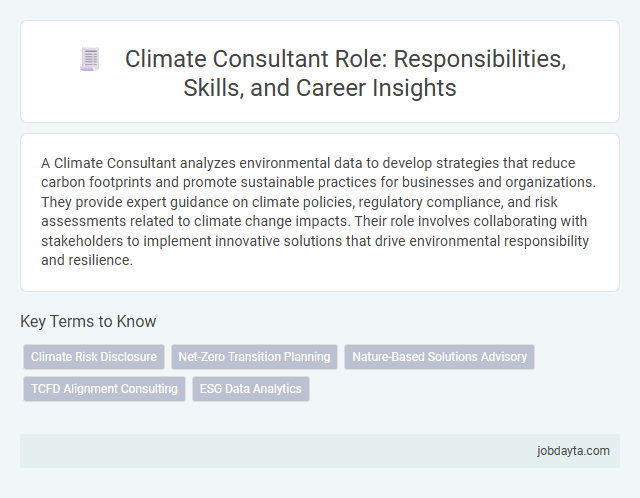A Climate Consultant analyzes environmental data to develop strategies that reduce carbon footprints and promote sustainable practices for businesses and organizations. They provide expert guidance on climate policies, regulatory compliance, and risk assessments related to climate change impacts. Their role involves collaborating with stakeholders to implement innovative solutions that drive environmental responsibility and resilience.
Overview of the Climate Consultant Role
A Climate Consultant provides expert guidance on environmental strategies to help organizations reduce their carbon footprint. They analyze climate data and develop actionable plans to meet sustainability goals.
Your role involves assessing risks related to climate change and advising on compliance with relevant regulations. Climate Consultants support businesses in adopting eco-friendly practices that drive long-term resilience and profitability.
Key Responsibilities of a Climate Consultant
A Climate Consultant analyzes environmental data to assess the impact of business operations on climate change. They develop sustainable strategies and recommend practices to reduce carbon footprints while ensuring regulatory compliance. Your role includes advising organizations on climate policies and implementing effective solutions to achieve environmental goals.
Essential Skills for Climate Consultants
Climate consultants play a vital role in guiding organizations toward sustainable environmental practices. Their expertise helps businesses reduce carbon footprints and comply with climate regulations.
Essential skills for climate consultants include strong analytical abilities to assess environmental data accurately. They must possess excellent communication skills to convey complex climate concepts to diverse stakeholders. Knowledge of climate science, policy frameworks, and sustainability technologies is crucial for effective consulting.
Educational Background and Certifications
A Climate Consultant typically holds an advanced degree in environmental science, climate studies, or a related field, ensuring a strong foundation in climate systems and sustainability principles. Specialized training in data analysis and environmental impact assessment further enhances their expertise.
Certifications such as LEED Accredited Professional, Certified Energy Manager (CEM), or Climate Change Professional (CC-P) validate a consultant's proficiency in implementing effective climate strategies. Your Climate Consultant's combination of education and certifications drives informed decision-making for sustainable project outcomes.
Tools and Technologies Used in Climate Consulting
Climate consulting integrates advanced tools and technologies to assess environmental impacts and guide sustainable decision-making. These resources empower you to implement effective climate strategies that align with regulatory and ecological goals.
- Geospatial Analysis Software - Utilizes GIS tools to map and analyze climate data, enabling precise environmental impact assessments.
- Carbon Footprint Calculators - Measures greenhouse gas emissions across operations to identify reduction opportunities accurately.
- Climate Risk Modeling Tools - Predicts potential climate change effects on business assets, aiding in resilience planning and mitigation strategies.
Career Path and Advancement Opportunities
Climate consultants guide organizations in reducing environmental impact through data analysis and sustainability planning. Career paths typically begin with roles in environmental science or engineering, advancing to specialist and senior consultant positions. Opportunities for growth include leadership roles in project management, policy advising, and strategic sustainability consulting.
Industry Sectors Hiring Climate Consultants
Climate consultants play a crucial role in guiding businesses through sustainability challenges and regulatory compliance. Various industry sectors actively seek their expertise to meet climate goals and reduce environmental impact.
- Energy Sector - Focuses on transitioning to renewable sources and reducing carbon footprints.
- Manufacturing Industry - Implements sustainable production processes and waste management strategies.
- Real Estate and Construction - Emphasizes green building practices and energy efficiency standards.
Your organization can benefit from tailored insights by engaging a climate consultant experienced in these key industries.
Challenges Faced by Climate Consultants
Climate consultants play a critical role in advising organizations on sustainability strategies and regulatory compliance. They face unique challenges that require specialized knowledge and adaptive problem-solving skills.
- Complex Regulatory Landscape - Navigating evolving climate policies and international agreements demands continuous learning and strategic interpretation.
- Data Uncertainty - Managing incomplete or inconsistent climate data complicates risk assessment and decision-making processes.
- Stakeholder Engagement - Balancing diverse interests among governments, businesses, and communities requires effective communication and diplomacy.
Impact of Climate Consultants on Sustainability Goals
How do climate consultants contribute to achieving sustainability goals? Climate consultants provide expert guidance on reducing carbon footprints and enhancing environmental practices. Their strategies help organizations implement effective sustainability initiatives that align with global climate targets.
Tips for Aspiring Climate Consultants
| Tips for Aspiring Climate Consultants |
|---|
|
Related Important Terms
Climate Risk Disclosure
Climate consultants specialize in assessing and advising organizations on climate risk disclosure, ensuring compliance with frameworks like TCFD and SEC regulations to enhance transparency for investors and stakeholders. They analyze environmental data, develop risk mitigation strategies, and support companies in integrating climate-related financial risks into their reporting processes.
Net-Zero Transition Planning
Climate consultants specializing in net-zero transition planning analyze carbon footprints, develop customized decarbonization strategies, and guide organizations in implementing renewable energy solutions and energy efficiency measures. They ensure compliance with evolving regulatory frameworks while optimizing financial incentives to achieve sustainable, long-term climate resilience.
Nature-Based Solutions Advisory
Nature-based solutions advisory in climate consulting leverages ecosystems to address climate challenges, enhancing carbon sequestration, biodiversity, and resilience. Experts provide tailored strategies integrating wetland restoration, reforestation, and sustainable land management to meet regulatory targets and corporate sustainability goals.
TCFD Alignment Consulting
Climate consultants specializing in TCFD alignment provide strategic guidance to organizations seeking to integrate climate-related financial disclosures into their reporting frameworks. Their expertise ensures compliance with Task Force on Climate-related Financial Disclosures recommendations, enhancing transparency in governance, risk management, and climate strategy for investors and stakeholders.
ESG Data Analytics
Climate consultants specializing in ESG data analytics leverage advanced tools to assess environmental, social, and governance metrics, enabling organizations to identify risks and opportunities for sustainable growth. Their expertise supports compliance with regulatory standards and drives impactful strategies through precise data-driven insights.
Climate Consultant Infographic

 jobdayta.com
jobdayta.com